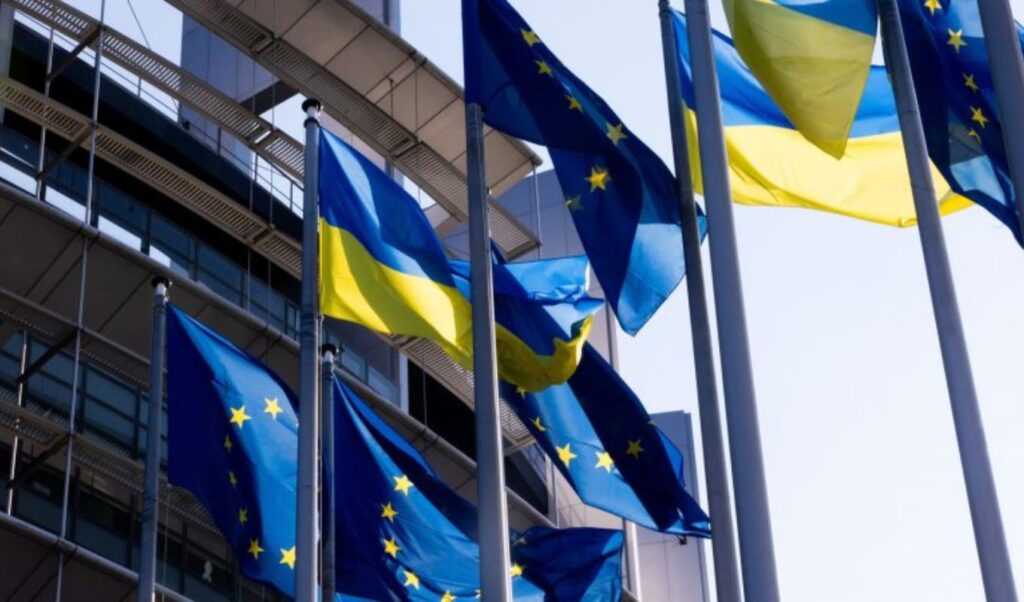The European Union is considering a proposal that would allow new countries to join without full voting rights, as part of an effort to bypass vetoes from Hungary and other states regarding Ukraine’s membership and accelerate the enlargement process.
Politico, which revealed the plan, reports that it is in an early stage and, according to European diplomats, requires unanimous approval from all member states to proceed. The idea envisions that new members would only gain full rights after completing the EU’s institutional review, aimed at limiting individual countries’ ability to block policies or critical decisions through vetoes. This initiative is supported by states that want to restart enlargement, such as Austria and Sweden, which believe the process has been “frozen” due to Hungary’s stance and other governments.
Enlargement has become a strategic priority for the EU amid Vladimir Putin’s expansionist policies. However, the prospect of increasing member states from 27 to 30 in the next decade reveals deep internal disagreements.
“Enlargement cannot be delayed because individual member states block changes”
The chairman of the European Affairs Committee of the German Parliament, Anton Hofreiter, emphasized that “future candidates must waive their veto right until basic institutional reforms are implemented, such as adopting qualified majority voting for most policy decisions.” As he said, “enlargement cannot be delayed because individual member states block changes.”
Based on the proposal, countries like Ukraine, Moldova, and Montenegro could join partially, enjoying the economic and institutional benefits of the EU without, however, having veto rights.
According to European officials, the plan is being discussed informally between member states and the European Commission. The logic behind the proposal is that partial integration would allow more flexible terms without the need to revise EU Treaties — a process considered politically impossible in many capitals.
Internal resistance and concerns in the Western Balkans
Previously, EU leaders argued that such a revision is necessary before any new enlargement, warning that the entry of countries like Ukraine could cause institutional deadlock. Efforts to abolish the veto for existing members also face strong resistance, not only from Hungary, but also from France and the Netherlands.
Hofreiter argued that the new plan “would ensure that the EU remains functional even after enlargement.” As he said, representatives from Western Balkan countries have already expressed “positive signals” toward this direction.
The proposal comes at a time of intense dissatisfaction from countries that have been waiting years to join, despite making extensive reforms. Montenegro’s President Yakov Milatovic told Politico that “the last country to join the EU was Croatia ten years ago — and meanwhile the United Kingdom left,” adding that “it’s time to revitalize the European idea.”
Similar concerns were expressed by Ukraine’s Deputy Prime Minister Taras Katska, who called for “creative solutions” to advance the accession process, emphasizing that “waiting is not an option.” Ukraine’s candidacy remains frozen due to Hungary’s veto.
“We need a solution here and now,” Katska said. “Russia tests European security with drones — it does the same by undermining European Union unity.”
The enlargement framework
Commission President Ursula von der Leyen has placed enlargement at the center of her strategic agenda, seeking Ukraine and Moldova’s integration by 2030. Nevertheless, member states appear cautious, as the strengthening of far-right parties in many countries makes Union expansion politically difficult.
According to a draft of Thursday’s Brussels summit conclusions, enlargement is not even mentioned, provoking anger from countries that support the process.
Austrian Minister for European Affairs Claudia Plakolm warned that “if the EU doesn’t move faster and more effectively, it will lose ground to third actors who are already waiting to take its place.”
Next steps
On Wednesday, leaders of the Western Balkans – Albania, Bosnia-Herzegovina, Kosovo, Montenegro, North Macedonia, and Serbia – will meet in London within the framework of the “Berlin Process” to strengthen regional cooperation in view of their European prospects.
Meanwhile, the Commission is preparing to present the new enlargement package, which will include a proposal for institutional reforms so the EU is ready to welcome new members.




